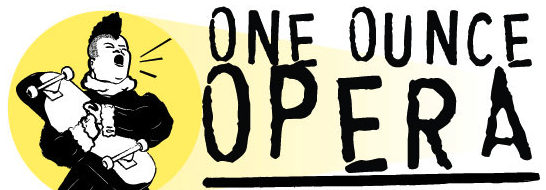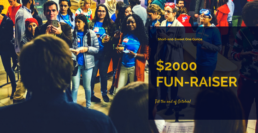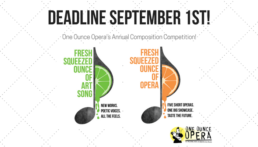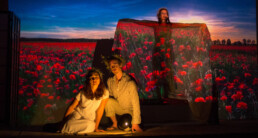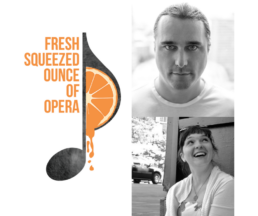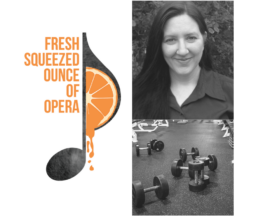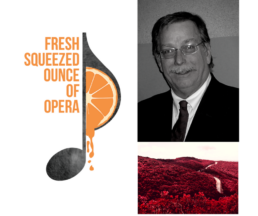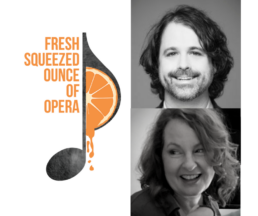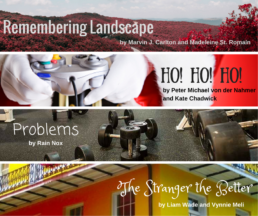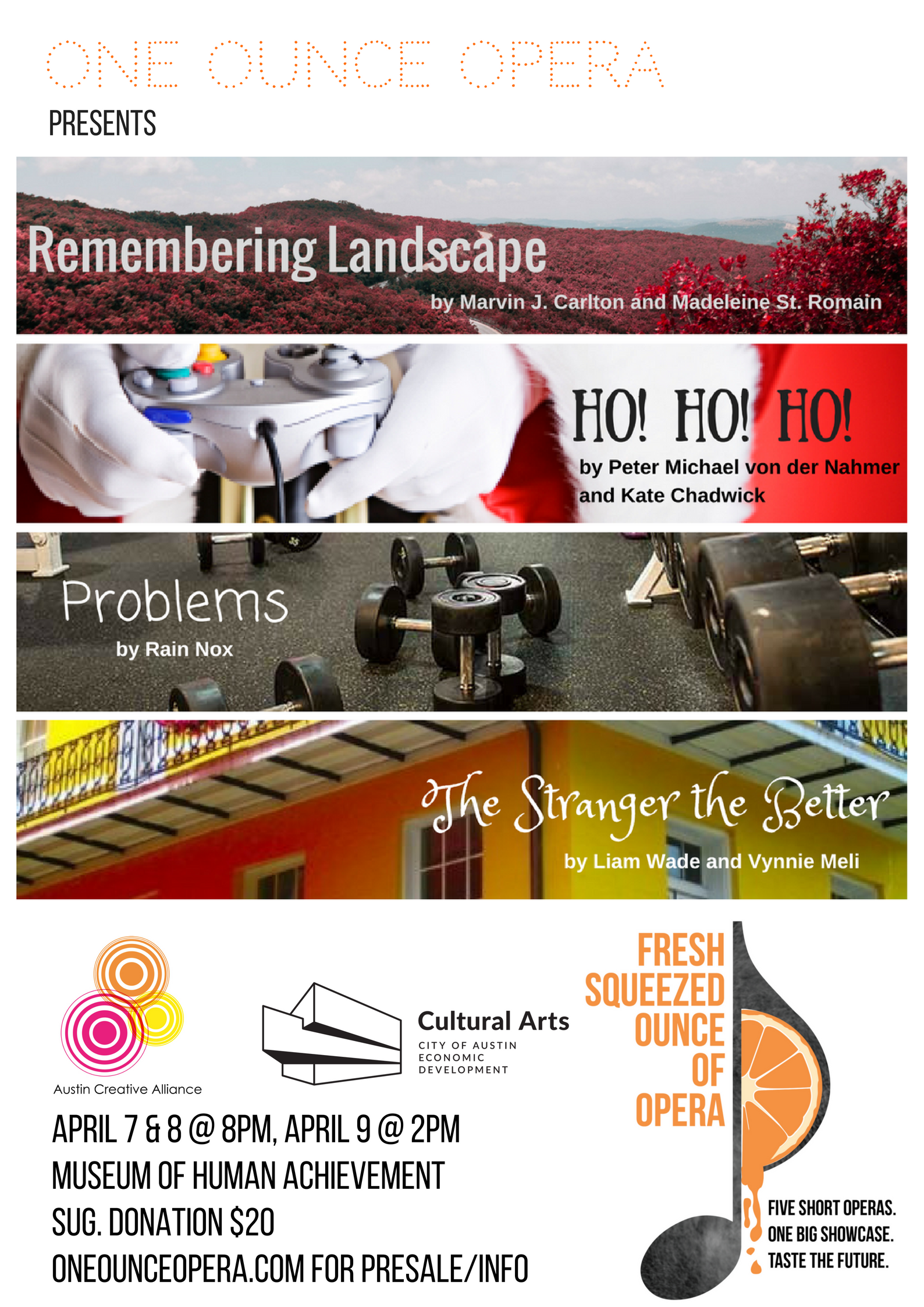Meet FSOAS '17 Winning Composer Marc Hoffeditz
Meet Composer Marc Hoffeditz, whose winning song Ne'er Part I will be sung by Soprano Elise Leung Kotara at the 2nd Annual Fresh Squeezed Ounce of Art Song on Friday, November 3rd.
The text is adapted from the beloved story of Peter Pan. In answering questions from Elise, Marc shares more insight, including how he hopes the audience will experience the piece.
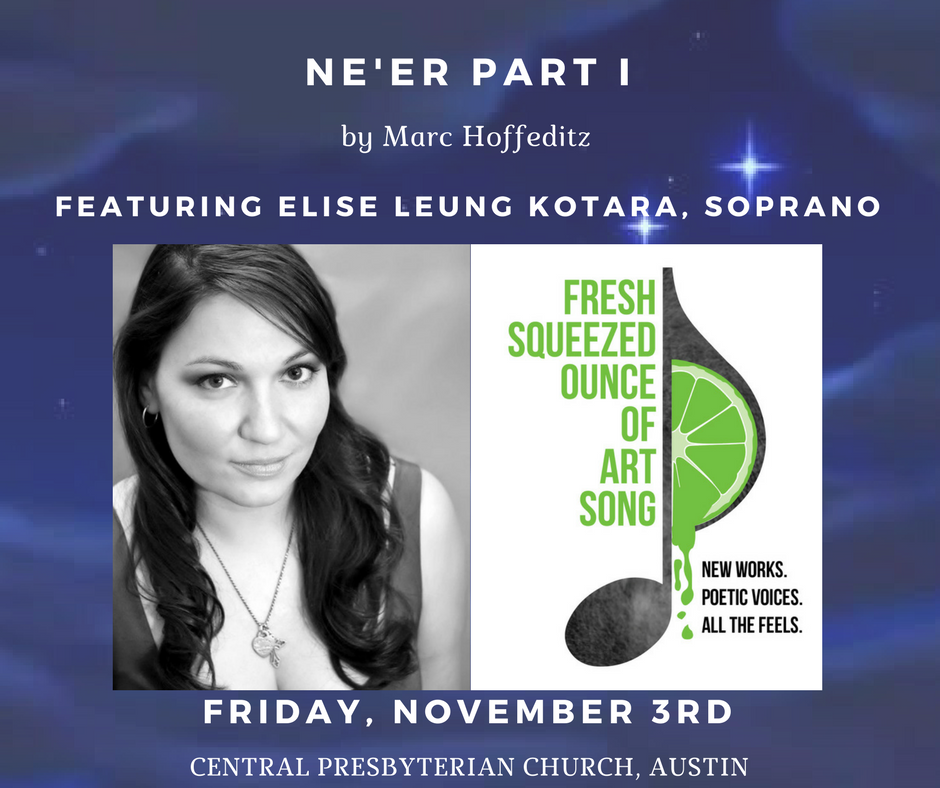 Elise: Peter Pan is a story beloved by adults and children alike. How did you go about preparing the text to be set to music, and what other decisions did you need to make about the text (the time signature, the mood of the piece, different sections of the story…)?
Elise: Peter Pan is a story beloved by adults and children alike. How did you go about preparing the text to be set to music, and what other decisions did you need to make about the text (the time signature, the mood of the piece, different sections of the story…)?
Marc: This text is specifically adapted from the 1911 novel entitled 'Peter and Wendy' (in the public domain-woohoo!), but most people are familiar with the original play (1904, still copyrighted) or the Disney movie. What I love most about this story in particular is that I feel people approach Peter Pan with a cheery mindset, but the original book has a much darker perspective of the action and is framed more from the angle of growing up and the hardships associated with the psychology of aging. 'Two is the end of the beginning' is a line from one of the earlier chapters, referencing the point in which we realize we will not be children forever, and I thought ‘WHAT. THIS IS SO CHILLING. HOW IS THIS A CHILDRENS BOOK’? So I agree, it's definitely a classic for both children and adults, but Barrie's intentions were much deeper than a silly tale about pirates and learning to fly.
A little background on how the piece came to be: It was commissioned by my friend Sarah Hennessey for her senior recital in Boston and she was looking for a piece that described the sensation of being too young to be a grownup, but being too old to be a child. Enter Peter and Wendy! The direction we decided to take was to look at the story from Wendy's perspective and frame it as her, now a mother, looking back at her adventures and reliving certain parts of her youth. A plot beyond retelling the original story was really important to me to solidify why we were revisiting this tale in particular and to help better understand the dramatic construction of the piece. In this case, the beginning, middle, and end are anchors for her role as mother and the portions between reference her transition from child to adult and vice versa.
In terms of preparing the text: I read the whole book, marking different sentences that stuck out or followed the dramatic structure I was looking for. From there, I adapted the remaining fragments into 9 movements (full version), trying to keep as much of the original text as possible instead of trying to paraphrase. Honestly, it took much longer to read, decide on, and adapt the text than it did to write the score, mainly because I was hearing the music as I was working through the story, but I'd never spent so long with the text of a piece before.

In terms of setting the text: My music in general likes to teeter between humor and pathos and I think Part 1 definitely reflects that both textually and formally. As a general rule of construction, I tried to have the more referentially 'child-like' parts of the music written in compound meters and the 'grown up' portions written in simple meters. From there, I wanted to juxtapose the blurriness of identity that Wendy felt by referencing both metrical constructs throughout the piece. This is highlighted in the 2nd movement when mother Wendy sings about her childhood in 6/8 while highlighting two main beats (1 & 4) that suggest it could be a simple meter. In the 3rd movement, Wendy is trying to act like her mother by singing in 2/4, but the appearance of gestural dance interludes that hint to a compound meter interrupt her intentions.
Although this is the first real song cycle I have written with such a strong thematic continuity, I found it important to keep things varied and interesting by trying not to telegraph what might happen next. In the end, the piece is comprised of a bunch of styles and influences, but I think the portions of recitative ground the piece and remind you that you are listening to not just a song cycle, but a very relatable story.
Elise: When did you start composing - and what or who were your early passions and influences?
Marc: I started composing little pieces back in the 6th grade. I didn't really think much of writing music seriously until my senior year, when I wrote a 26 song musical about Abraham and Mary Todd Lincoln called An American Love Story (yes, cheesy as hell). From there, I started studying composition in college and haven't stopped since! (Haven't written another musical though....but maybe that's okay)
I was a big musical theater fan in high school (hence the creation of an egregiously long musical) and I think both Stephen Sondheim and Schwartz were really early influences. The end of Pippin always made me super uncomfortable, yet I couldn’t stop going back to listen and is probably why I like the possibilities of devil’s advocacy in my music. I also remember being 17 or 18 watching Into the Woods and sobbing uncontrollably when ‘Children will listen’ started playing. I think these were really defining musical experiences and a large reason why as to why I like to re-contextualize popular stories and play with a landscape of contrasting emotional experiences
Nowadays, I think my influences include Benjamin Britten, Alban Berg, and an array of styles found in the early 20th century reinterpreted through 21st century ears. I also really respond well to Libby Larsen, Thomas Ades, and George Benjamin. Non-musical influences include anything to do with identity, especially how we formulate it today through our technological word and weird or uncomfortable subjects approached with a sense of universality and pathos.
Elise: Do you have any specific hopes about how people might experience this piece?
Marc: I don't really have any expectations of how people will perceive my works as they are happening, but I think from the performer’s perspective that knowing the larger arc and the beginning-is-the-end aspect should be highlighted. A big reason I love writing vocal music is because I love storytelling and I like to emphasize that to those that perform my works. You are NOT just a singer, you are a story teller! Tell us a story and get us hooked on whatever you are singing! The only way the audience is going to believe what is happening and what they are hearing is if you truly believe it and imbue yourself in it.
JOIN US TO EXPERIENCE ELISE PERFORM MARC'S "Ne'er Part I" on NOV. 3rd!
_____
Marc Hoffeditz is a composer of vocal and instrumental music searching to balance the humors of sarcasm, pathos, camp, and vulnerability. He has made his mark on the indie opera scene with performances by Rhymes with Opera, OperaRox Productions, Hartford Opera Theatre, and Opera from Scratch (Nova Scotia). His song cycle/monodrama Ne’er was chosen for performance at the 2016 Minnesota Source Song Festival, where he worked with acclaimed American composer Libby Larsen. Recent performances include the premiere of There will be no more, a song cycle for tenor and piano with OperaRox Productions in NYC.
To learn more about Marc and his music, visit https://soundcloud.com/marchoffeditz.
One Month FUN-raiser! $2000 Goal
It’s fall, and what a perfect time to announce OOO’s short-and-sweet $2000 one month FUN-raiser! Every cent supports our mission and our singers, and the programming you love. Now through the end of October!
YOUR GIFT IS TAX-DEDUCTIBLE. Here’s how:
- Visit our fiscal sponsor — Austin Creative Alliance — at this link here–> https://www.austincreativealliance.org/donate/SPdonate/#!form/DonateSP
- Scroll down until you see “One Ounce Opera” and click on the ADD button in our box.
- Type in ANY amount and click ADD. You will be directed to ACA’s secure payment screen.
- Follow the directions, and that’s it! You’re done!
A few key ways your donation will be put to use:
- Funding the launch of our Community Programs, providing FREE performances for those who might not otherwise have access — first one is for the beautiful women’s choir at Reagan High School on November 1st, 2017!
- Space rental, both for rehearsals and performances.
- Costumes, props, set pieces, lights, projections, and the many talented folks that design and direct different creative aspects of our productions.
- Administrative support, including website maintenance/rebuild.
- The singers! We love our talented crew, and we know you do, too!
- CREATION and implementation of exciting new programming.
- RECORDINGS! Your gift will allow One Ounce to reach audiences world-wide when we release new professionally-produced video and audio!
Thank you in advance for your generosity. We wouldn’t exist without your support!
2017-18 Fresh Squeezed Ounce Series Competition for Art Song and Opera
CALL FOR SHORT OPERA and ART SONG SUBMISSIONS!
Composers and librettists: We’d like to formally invite you to submit work to our 2017-18 Fresh Squeezed Ounce Series Competition. Winning pieces will be produced and performed by One Ounce Opera in Austin, Texas.
DEADLINE FOR SUBMISSION OF SHORT OPERA and/or ART SONG IS SEPTEMBER 1ST, 2017.
This will be the 3rd annual FSO-Opera, and the 2nd annual FSO-Art Song. These events are part of One Ounce Opera’s “Fresh Squeezed Ounce” series, celebrating new works and contemporary voices. In addition to having their works produced and performed in Austin, One Ounce Opera spotlights each composer/librettist in an informative blog post that includes an informal interview, each work is highlighted in our newsletter and on social media, and each winner receives a live video and audio recording. At each event, composers/librettists who are able to attend will be acknowledged and awarded a certificate (and some swag).
FAQ:
Where can I see the official rules for each competition? Guidelines appear on each entry form. Buttons for each can be found below. Consider your current luck is mostly a chop activity book of ra no deposit bonus 2021. Please review the rules in detail before submitting any work. Works that do not fit within the guidelines will not be considered.
When are the performances? FSO-Art Song is November 3, 2017. FSO-Opera is April 6-8, 2018. Free community performances, which include selections from each program, will be announced at a later date.
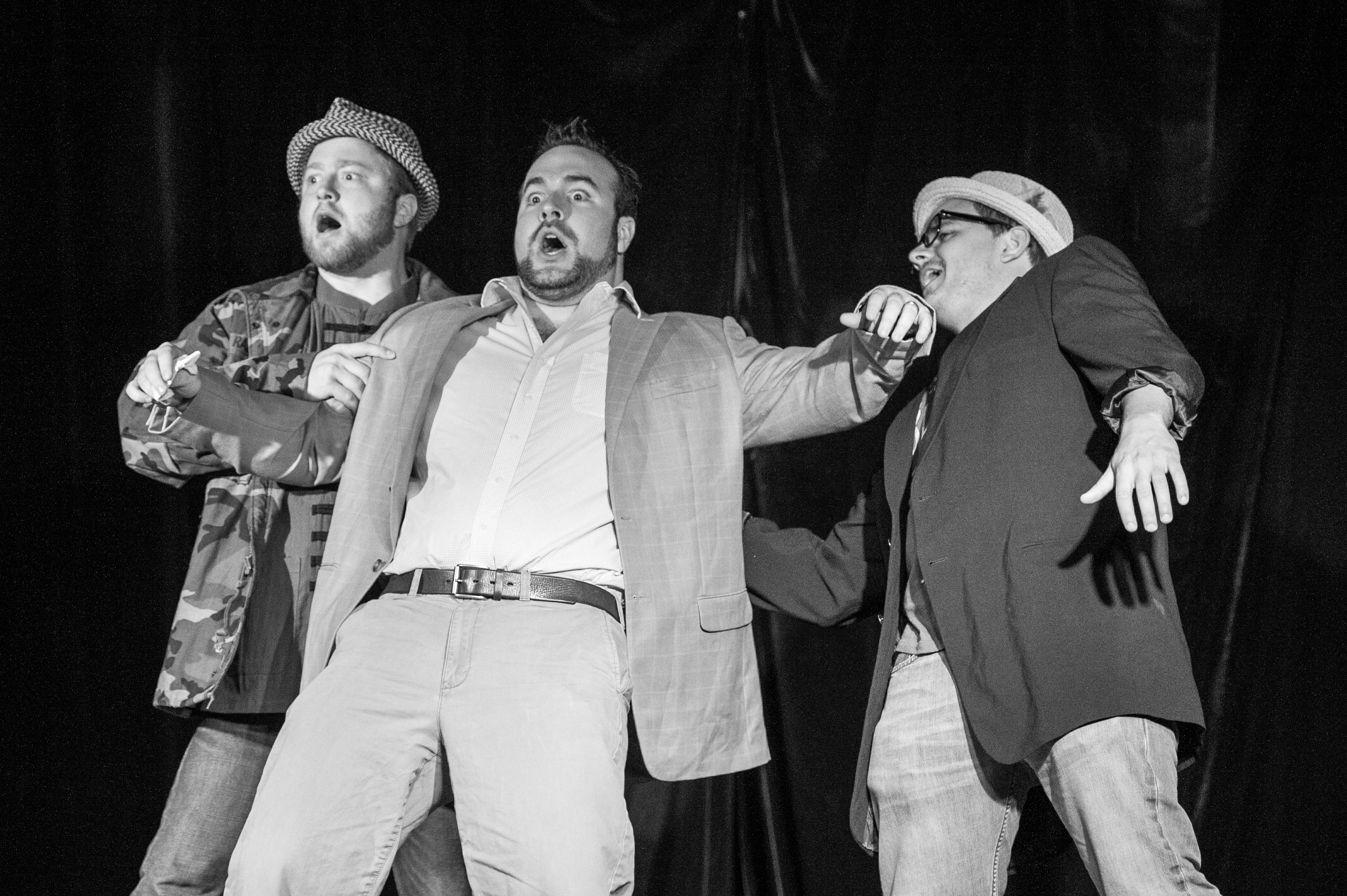 How do I submit my files? On the entry form, you will supply LINKS to an online folder or files. We must be able to download the score and libretto. For accuracy, please convert all text/score files to PDF before sending. Example of what/where to upload and link to: Dropbox folder, Google Drive, YouTube, SoundCloud, other storage methods that can be accessed via link. The required materials are listed on the form(s).
How do I submit my files? On the entry form, you will supply LINKS to an online folder or files. We must be able to download the score and libretto. For accuracy, please convert all text/score files to PDF before sending. Example of what/where to upload and link to: Dropbox folder, Google Drive, YouTube, SoundCloud, other storage methods that can be accessed via link. The required materials are listed on the form(s).
Am I allowed to submit more than one work? YES! As long as each submitted work follows the guidelines of the individual competition (art song v. opera), we welcome multiple entries.
I submitted an art song and an opera. Could they BOTH be chosen? YES! If you, however, submit more than one art song cycle or micro-opera, it is less likely that more than one of each would be chosen to fill the same program.
How will I know if my work was chosen? Winning works will be announced via Facebook and a post on this site, and the winners will be notified shortly thereafter. Copies of all parts and any revisions will be due at that time.
How do I keep up with any new developments in the competition? For the latest details, we strongly suggest following One Ounce Opera on Facebook, and adding yourself to the Facebook event page.
Once again, when exactly is the deadline? The hard-and-fast deadline for entry into either FSO-Art Song or FSO-Opera is 11:59pm on September 1st, 2017. Only complete applications — with all required materials received as requested by the deadline — will be considered.
I have a question not answered here. How do I get in touch? Click here to send us a message about the competition!
FSOO 2017 Gets Reviewed, and Exclusive Performance Pics!
The 2nd Annual Fresh Squeezed Ounce of Opera, which took place April 7-9, 2017, brought together composers from across the US — and Germany! — and the One Ounce Singers you know and love for one BIG, juicy showcase.
We tasted the future of opera, and it was GOOOOOD.
So good, the Austin Chronicle printed an entirely favorable half-page review! Here’s a little snippet:
“…when OOO set out to do this Fresh Squeezed Ounce thing again, we figured it’d be at least as enjoyable a gig as the one in 2016 – and it was….And here’s hoping there will be another one next year.” READ THE ENTIRE REVIEW HERE.
Meet Peter Michael von der Nahmer and Kate Chadwick, FSOO 2017 Winners
It is November 25th, 2014. We are in the video game section of a chic toy store in New York City. We meet a thirteen-year-old boy and his dad's girlfriend. What happens next is...Ho! Ho! Ho!, written by composer Peter von der Nahmer and librettist Kate Chadwick, premiered at the Hartford Opera Theater in 2015. OOO is proud to present its Texas premiere.
We asked for more insight into the piece. Here is Peter's response:
Peter: Kate and I have worked on several short music theater pieces that all carry the common nominator of understanding and reaching out in the deepest parts of what makes us who we are and how we approach the world.
My biggest inspiration for every new piece is always a long conversation with the writer about the piece, the characters and the story itself. It is in this very moment when reading a text that three possible things might happen.
- I get immediately a sense for what the musical world needs to be, not what I want it to be.
- I don’t hear any music or all. Which might be that the text is written in way that doesn’t really call to be musicalized or simply I feel that the piece itself wants to be everything else but a music theater piece.
- I am excited about both the story, the characters and how the language is represented but I feel that the music is in a different musical area/genre/style that I need to learn before starting to work on it. This is normally the moment when I am most excited about a new piece because it means that this piece is a new venture for myself, something to unravel and discover and something new for me to learn. This is also not as simple as just saying, oh this piece uses an Rock and this is piece uses a 12 tone scale as it then might be simply a bad version of either of those styles. What I really mean with it that I want that the piece tells me what it wants musically and not me telling the piece what it has to be. This is also means that you as the creator need to have a different kind of openness and willingness – almost similar to a psychoanalyst – to let happen what needs to happen and to give in to the drama of the piece as much as you can. You need to see and feel those characters family members that you dare to ask all sorts of questions and don’t run away when you get an answer that might confuse you.
After writing numerous pieces for the stage I have also given up on trying to know or guide what I think needs to be written by my and another librettist.
Rather have I realized that it is not about what ever piece another librettist and I think could be a good new idea but asking what piece can only be written by the two of us. What makes us both special in our backgrounds and knowledge and how do these two world come together to create a unique artistic experience. Sometimes it doesn’t work because we might realize that our approaches are to different in the end but more often it might lead to new ideas for pieces that we would have never created would we have gone the „easy“ road of trying to dictate a certain project.
It requires a lot of listening to each and searching for those hidden stories that feel interesting. I think all of this comes from my life long search in trying to understand the human mind and the human condition and my idea that every person, however strange they are, might have an important message for you, that is worth listening to because you might gain a new understanding not only of the other person but also through the other person about yourself.
This is the same with HO! HO! HO! where we have two people in the very beginning we know very little about, even more we might have no clue of where this piece is actually going. It starts even musically out with a rather classical recitative, a somewhat old fashioned way of approaching a contemporary opera but it lures you in a world where things might appear safe, maybe you have the feeling of control, of knowing where things might go next, only when everything turns a sudden shift. The way to go in pieces that seem or appear comedic is always that you as writers need to take your characters very seriously. I personally don’t believe that there is any kind of music that is in itself comedic in nature. Maybe there are sounds of instruments that one mind find funny because they resemble other noises we connect with „funny“ noises but I don’t think that music in itself is funny. A comedic moment comes from how we personally experience either the connection between music and text or images or simply what we find in general funny.
In writing the music to the libretto I carefully tried to give each character enough space to develop both story and music wise. In quick dialogues I find this always very tricky because you as the composer might tend to writing a music that might simply underscore both charters.
In HO! HO! HO! I tried as much as possible to stay as individual character that have their own musical world that we get drawn into so when I am playing not only with there motives but overall sound world the audience really can get a visceral feeling of what is happening on stage and they can decide for which character they route. The idea of having a tenor voice stand in for the little boy, rather than having a boy sing the part has many reasons. First the the text and subject matter but I also think it created an interesting conflict for the audience of saying a man behave as child which in itself is more interesting and "funnier“ than having an actual child play the role.
The last thing to say about the inspiration is not so much how video games have became a problem for kids, as I think games are not a new thing any more. Even I like to play computer games from time to time.
The problem is our loss or lack of listening to each other and understanding what the other person has to say or needs at this very right moment and how we can
find a way to give each person other what we need without being disrespectful because in the end bad things might happen because all our emotions are bottled up until they explode and we say :“I’m hardly ever violent. But….“.
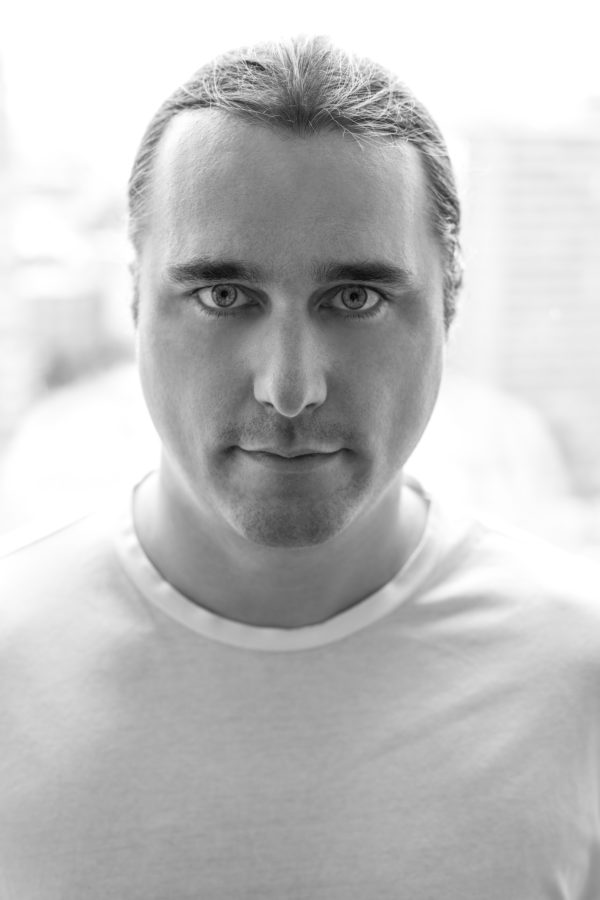 Peter Michael von der Nahmer (“Mike") is a composer and sound researcher based in New York City. His American/German/Cuban heritage influences the questions of identity, complexity, and transcendent connection that shape his music. He has written over 27 works for music theater and dance, and over 100 works for concert and film; many have received national/international awards, and been performed around the world. Most recently he was awarded the 2016 McKnight Visiting composer residency, where he will work on new musical theater pieces with the teenagers and seniors from New Ulm, MN concerning the history of the town. Mike holds a B.A. in composition from the University of Music and Performing Arts, Munich and an M.A. in Music Therapy from the University of Augsburg. He holds certificates in Film Scoring from the UCLA, and in Music Pain Treatment (music therapy treatment for patients with chronic pain) from the Magdeburg-Stendal University of Applied Sciences. In May 2015, he received an M.F.A. in Musical Theater Writing from New York University. He also studied traditional Chinese music with composer Wang Ai Qun. Beyond his formal training, he was influenced by his father, an artist and healer who was later a Hindu priest; by traditional forms of healing, fairytales and myth; and by traditional Jewish and Indian music. His work naturally connects western classical music with other musical forms. Mike’s barrier-breaking, eclectic background explains his passion for music both as artistic expression and as a means to connect disparate cultures. His desire to be an agent of radical connection – to literally create harmony out of apparent dissonance – is his defining motivation. Find out more about Peter Michael on his website, www.petermichaelvondernahmer.com
Peter Michael von der Nahmer (“Mike") is a composer and sound researcher based in New York City. His American/German/Cuban heritage influences the questions of identity, complexity, and transcendent connection that shape his music. He has written over 27 works for music theater and dance, and over 100 works for concert and film; many have received national/international awards, and been performed around the world. Most recently he was awarded the 2016 McKnight Visiting composer residency, where he will work on new musical theater pieces with the teenagers and seniors from New Ulm, MN concerning the history of the town. Mike holds a B.A. in composition from the University of Music and Performing Arts, Munich and an M.A. in Music Therapy from the University of Augsburg. He holds certificates in Film Scoring from the UCLA, and in Music Pain Treatment (music therapy treatment for patients with chronic pain) from the Magdeburg-Stendal University of Applied Sciences. In May 2015, he received an M.F.A. in Musical Theater Writing from New York University. He also studied traditional Chinese music with composer Wang Ai Qun. Beyond his formal training, he was influenced by his father, an artist and healer who was later a Hindu priest; by traditional forms of healing, fairytales and myth; and by traditional Jewish and Indian music. His work naturally connects western classical music with other musical forms. Mike’s barrier-breaking, eclectic background explains his passion for music both as artistic expression and as a means to connect disparate cultures. His desire to be an agent of radical connection – to literally create harmony out of apparent dissonance – is his defining motivation. Find out more about Peter Michael on his website, www.petermichaelvondernahmer.com
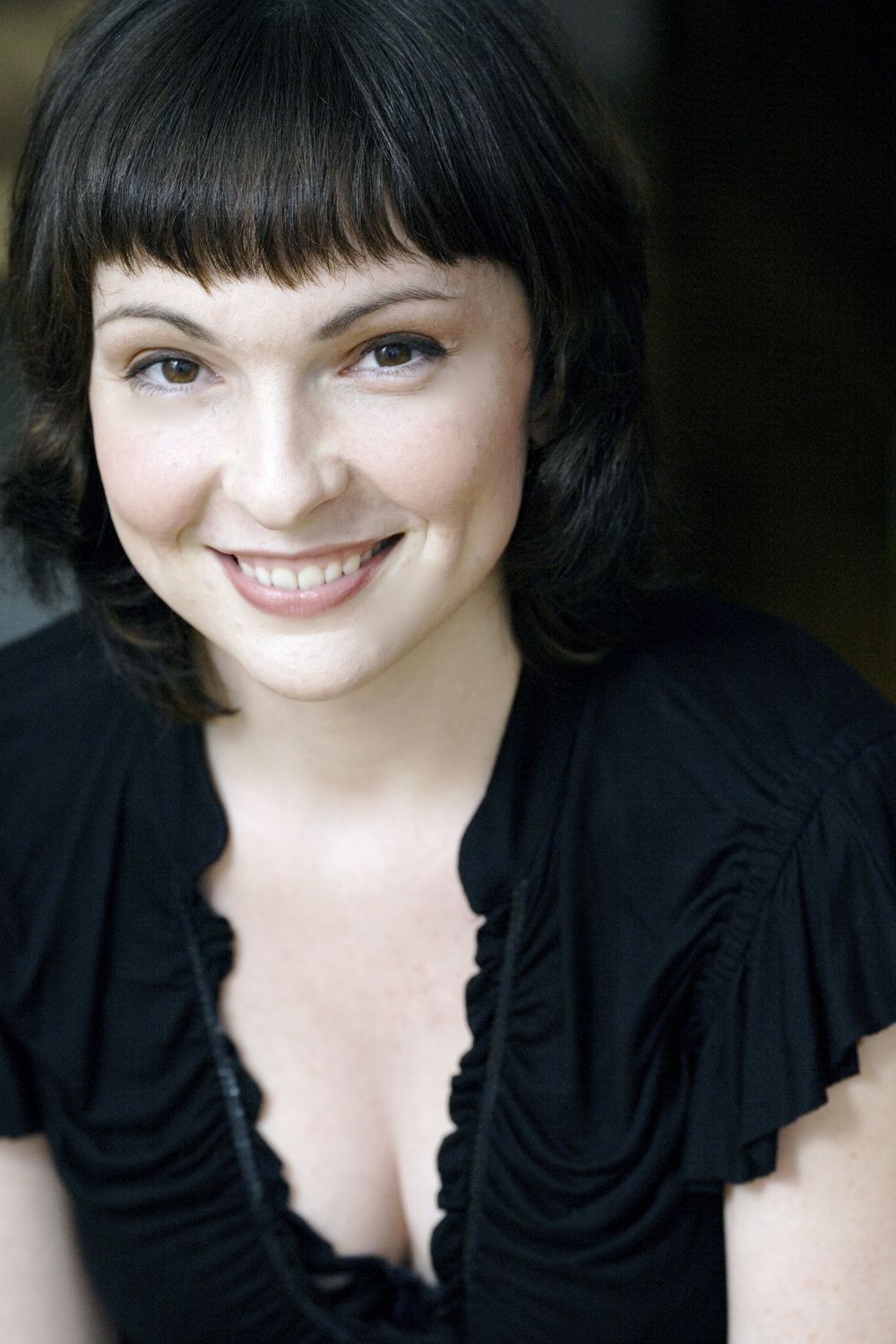
Kate Chadwick (librettist) grew up in ballet, taking classes, participating in summer intensive programs, and performing all through childhood. She has a BA (high-honors in musical theatre) from the University of California, Irvine, and a post-graduate degree from The Oxford School of Drama. After school, she performed lead roles in regional theatre productions in the US and the UK (leads in Guys and Dolls, The Music Man, The Sound of Music, My Fair Lady, Brigadoon, Sweeney Todd). She graduated from NYU’s Graduate Musical Theatre Writing Program in May 2015, and had a showcase of her songs in the Mr. Finn’s Cabaret series at Barrington Stage in July of 2015. She will have a reading of her show Butterflies at Barrington Stage in the summer of 2017, directed by Graciela Daniele, and has had songs performed in cabarets around New York City (The Laurie Beechman Theatre, 54 Below, Sardi’s). www.katechadwick.com
Meet Rain Nox, FSOO 2017 Winner
In the fall of 2016, during the Inaugural Fresh Squeezed Ounce of Art Song, OOO premiered Composer/Librettist Rain Nox's cycle "Water Songs." Her submission to FSOO 2017 had us rolling from the first page -- Problems is a short opera with an unusual setting: a strip mall gym. OOO is happy to bring Problems to life for the very first time. Here's more from Rain:
1) (from Maureen, singing Viki) How/when did you come up with the idea to set an opera in a gym?
Rain: Since I started going to the gym regularly before work I started to notice the same people are there every day- a couple who train together with a coach, an older gentleman and a young woman who seem to push themselves to their limits in every workout. There are people that never seem to miss a single day. I started to think about how for many of us the gym is a place which both accentuates our insecurities and provides an outlet for overcoming our insecurities. Viki’s character and song was actually the basis for the entire opera- a place where a “problem” that seems petty could actually be part of a much more serious issue that no one else could know about. What could be going through other people’s minds as they are running on a treadmill? We have no idea what anyone else is going through at any given time, what’s behind the forced smile of the cashier at the grocery store, why the car inspection clerk was curt. The more we remember that, the nicer I think our society will be.
2) (from Julie F, director) Each character’s moments are unique, as are their personalities. How did these characters — and their “problems” — come to be? Any basis on, um, personal experience? :)
Rain: Most of my characters are based on my personal experiences, situations I have observed, or experiences shared with me by those who are close to me. Being annoyed at having to wait for a cardio machine is such a “first world” problem, one that I am unfortunately guilty of. I actually don’t get mad when my husband checks out other women’s butts, because I do that too- we can’t help seeing what is around us! I tried to have each character show a different level of how “serious” most people would consider a problem to be, although in reality it makes no sense to compare problems. Nothing good can come out of trying to judge the validity of someone else’s problem. Writing this micro-opera made me feel incredibly lucky about my life situation and so grateful about how few “problems” I really have.
____
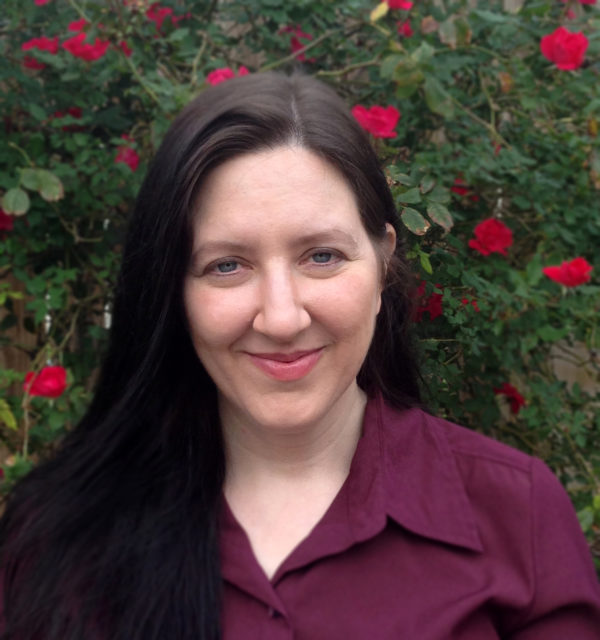 Rain Nox received her Bachelors of Music in Composition from the University of Texas at Austin. Since graduating she has composed six one act musicals, including Sisters of the Sea that was featured in Best of Fest at Fronterafest, and three full length musicals, including Crazy Like a Person, which won Best Original Play at the City Theatre’s Summer Acts festival. She is also the lead singer and bassist for local rock band Rise from Fire, whose first album will be released this summer. She is honored to have her second performance with One Ounce Opera, who premiered her work Water Songs last November. https://soundcloud.com/rainnox
Rain Nox received her Bachelors of Music in Composition from the University of Texas at Austin. Since graduating she has composed six one act musicals, including Sisters of the Sea that was featured in Best of Fest at Fronterafest, and three full length musicals, including Crazy Like a Person, which won Best Original Play at the City Theatre’s Summer Acts festival. She is also the lead singer and bassist for local rock band Rise from Fire, whose first album will be released this summer. She is honored to have her second performance with One Ounce Opera, who premiered her work Water Songs last November. https://soundcloud.com/rainnox
Meet Marvin J. Carlton and Madeleine St. Romain, FSOO 2017 Winners
Remembering Landscape is a post apocalyptic opera for three singers and piano. During FSOO 2017, One Ounce Opera will present the premiere performance of the piece, written by composer Marvin J. Carlton and librettist Madeleine St. Romain. It will feature Maureen Papovich, Julie Silva, and Robert LeBas.
Q: (from Julie Fiore, stage director) Marvin, the music is woven together almost like a chorale, especially the opening trio. From where did you draw your inspiration for the style of music in this piece?
Marvin: "Remembering Landscape" is the second opera that Madeleine and I have done together. In both operas, I have found that Madeleine's words frequently invite ensemble singing, and to me that is a good thing since I enjoy writing ensembles. When I first read the text, I was struck by the starkness of the opera and was compelled to write music that would reflect that starkness. Knowing that the characters had just encountered a disaster, I knew that they had to express their feelings individually but at time intertwining with each other. As for Chloe's scene midway through the opera, upon initial reading I heard music that was somewhat related to the sleepwalking scenes in several bel canto operas.
_____
Madeleine St. Romain is a writer and multidisciplinary artist.
With composer Nicole Chamberlain, she wrote Rabbit Tales for the Atlanta Opera. She was a librettist for the Atlanta Opera's 24 Hour Opera Project 5 times, which is how she met Marvin. They have written 2 operas together now, 3Ds Dance Hall, and Remembering Landscape.
With composer Robert Boury, she has written four family operas, Cedar Tree and River Water, Grandmother Spider Steals the Sun, Seastruck, and The Raspberry War.
____
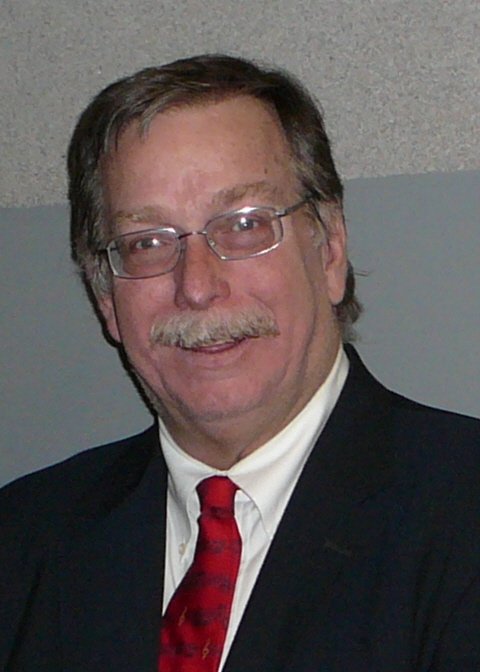 Marvin J. Carlton is an American composer of opera, art song, symphonic works, choral works, and chamber music. His micro-opera 3D's DANCE HALL won the audience choice award at The Atlanta Opera's 24-Hour Opera Project in 2013, while his opera PIE, PITHE, AND PALLETTE won the judge's award in 2016. His music has been heard in concerts by Belleville (IL) Philharmonic Chorale, Centralia (IL) Philharmonic Orchestra, The Atlanta Opera, International Double Reed Society, St. Martin Chamber Players, Heart of Illinois Woodwind Quintet, The American Patriot Wind Ensemble, and the Southern Illinois Grade School Vocal Music Association.
Marvin J. Carlton is an American composer of opera, art song, symphonic works, choral works, and chamber music. His micro-opera 3D's DANCE HALL won the audience choice award at The Atlanta Opera's 24-Hour Opera Project in 2013, while his opera PIE, PITHE, AND PALLETTE won the judge's award in 2016. His music has been heard in concerts by Belleville (IL) Philharmonic Chorale, Centralia (IL) Philharmonic Orchestra, The Atlanta Opera, International Double Reed Society, St. Martin Chamber Players, Heart of Illinois Woodwind Quintet, The American Patriot Wind Ensemble, and the Southern Illinois Grade School Vocal Music Association.
Several of his chamber works have been published by Imagine Music.
Meet Liam Wade and Vynnie Meli, FSOO 2017 Winners
One Ounce Opera is honored to welcome back Composer Liam Wade, whose winning piece "The Stranger the Better" will be performed during 2nd Annual Fresh Squeezed Ounce of Opera. His work with Librettist John Grimmett was chosen for FSOO 2016. Watch OOO perform it live here.
Librettist Vynnie Meli joins Wade for a New Orleanian romp through a modernized Stella, Blanche, and Stanley...with several unique twists. The cast had a couple of questions for the writing pair:
Q1 (from Jake Jacobsen, playing Stanley) Vynnie: A Streetcar Named Desire is a fairly classic play so I'm sure the characters will be attractive to the audience. How do you think people will relate to Stranger's Stella and Stanley?
Vynnie: THE STRANGER THE BETTER is not an adaptation, but it’s the closest I’ve come to one. It was liberating in the sense that it gives the audience a shorthand into the characters. Everyone has a preconceived notion of the Stanley Stella dynamic, so we could go further faster. We could take… liberties. Everyone also can relate to family interfering in relationships, and relationships interfering in family. As long as we stay true to that impulse, I think the audience will go along with us having as much fun as we did with these iconic characters. By the way, The Stanley Stella Dynamic - good name for a band.
Q2 (from the cast) Liam: the a cappella chorale towards the end is super nice. What was your inspiration for writing it?
Liam: The first version of The Stranger the Better that was performed at the 24 Hour Opera project was about 10 minutes long. The following week, Vynnie and I discussed how we could expand it. One of her comments was that she felt the line "I've always relied on the kindness of strangers." could use a little more of something. She did not say what, but she did specify about 15% more. So I set out to give her my usual 110%.
I had recently seen Così fan tutte in Amsterdam, and a show called Der Wildschütz in Dresden. In the case of Così, I found myself tripping out to the long, gorgeous lines in Mozart's ensemble writing. With Wildschütz, my favorite part was a beautiful moment that featured an a cappella quartet. I think every show needs a vocal payout/ reward. I thought it'd be effective to have a beautiful, vulnerable moment at the end to bring these four characters, and their voices, together.
Reserve your seats for FSOO 2017!
BIOS:
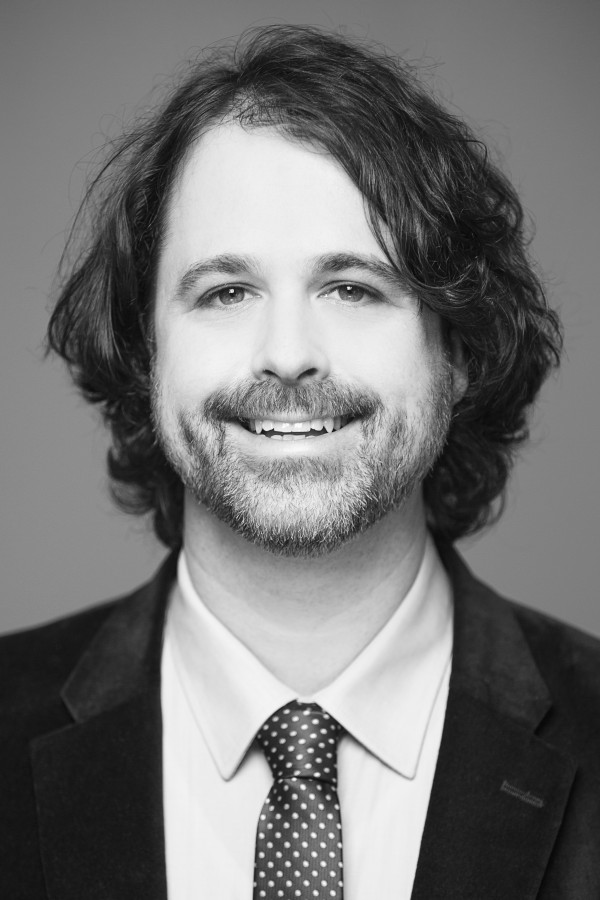
Liam Wade is an American composer of opera, art song, symphonic works and chamber music. His comic opera, Part of the Act, was commissioned by Washington National Opera and premiered at the Kennedy Center on their 2012-13 season. His one act opera, The Stranger The Better, won the Audience Award at The Atlanta Opera’s 24-Hour Opera Project in 2016. His music has been heard on concerts at La Jolla Music Society, ProQuartet France, Toronto Music Garden, One Ounce Opera (Austin, TX), The Atlanta Opera, Hartford Opera Theater, West Edge Opera, Academy of Vocal Arts, The Kennedy Center and Semperoper Dresden.
Website: www.liamwade.com
___
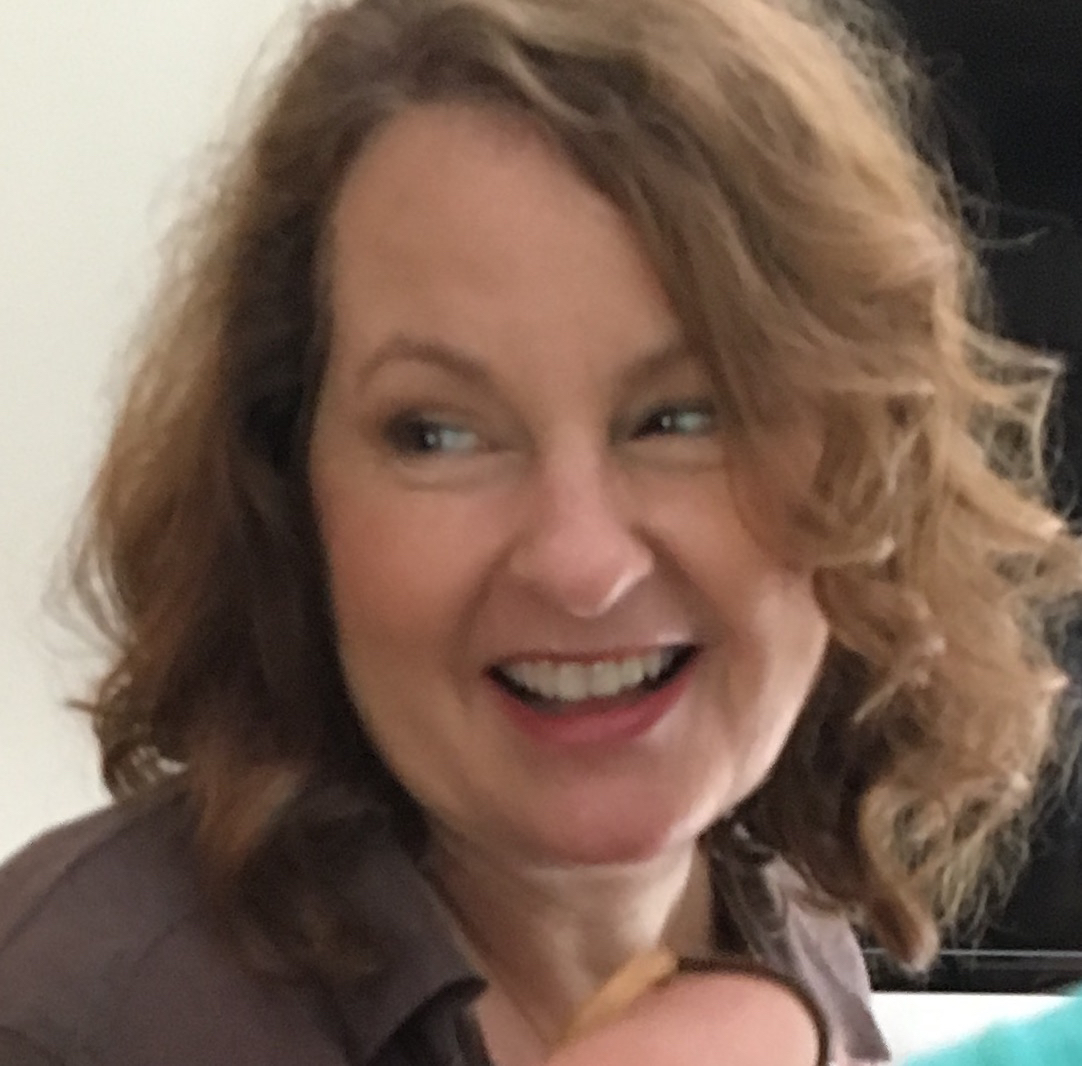 Vynnie Meli is a playwright, lyricist and librettist from Rochester, NY who’s lived in Atlanta long enough to miss snow. She went from sculpture to a career in advertising, but when she started writing in other people’s voices, she found her own. A Eugene O’Neill semi-finalist with numerous grants and awards, several of Meli’s works have been in theaters around the country and, most recently, an opera festival in Australia. Twice selected for the New York Musical Festival, her latest won numerous NYMF Awards and the Steele Spring Stage Rights Publishing Award. A CAPPELLA, a musical about finding your own voice, is in development at Alliance Theatre through the Reiser’s Atlanta Artists Lab. THE STRANGER THE BETTER is making the rounds in Atlanta, Hartford, Oakland, San Fransisco and St. Lewis. Now Meli and Wade are super happy to get fresh squeezed in Austin!
Vynnie Meli is a playwright, lyricist and librettist from Rochester, NY who’s lived in Atlanta long enough to miss snow. She went from sculpture to a career in advertising, but when she started writing in other people’s voices, she found her own. A Eugene O’Neill semi-finalist with numerous grants and awards, several of Meli’s works have been in theaters around the country and, most recently, an opera festival in Australia. Twice selected for the New York Musical Festival, her latest won numerous NYMF Awards and the Steele Spring Stage Rights Publishing Award. A CAPPELLA, a musical about finding your own voice, is in development at Alliance Theatre through the Reiser’s Atlanta Artists Lab. THE STRANGER THE BETTER is making the rounds in Atlanta, Hartford, Oakland, San Fransisco and St. Lewis. Now Meli and Wade are super happy to get fresh squeezed in Austin!
A member of Dramatists Guild, Inc.; Working Title Playwrights; TRU
Website: www.vynnie.com
Announcing: Winners of FSOO 2017!
After a national call-for-compositions, One Ounce Opera is proud to announce the Winning Selections for 2017's Fresh Squeezed Ounce of Opera Competition. Composer/librettist spotlight interviews coming soon, and a complete cast and production team list can be found here. Congratulations to this year's winners!
Call for Composers of Short Opera 2017
CALL FOR SHORT OPERA SUBMISSIONS!
Composers: We’d like to formally invite you to submit short operas to our 2017 Fresh Squeezed Ounce of Opera Competition. Winning pieces will be produced and performed on April 7, 8 & 9 in Austin, Texas.
This will be the 2nd annual FSOO, and the 3rd event as part of One Ounce Opera’s “Fresh Squeezed Ounce” series, celebrating new works and contemporary voices. In addition to having their works produced, winning composers receive a small honorarium and a live recording of one of the performances.
To apply, send a score and supplementary materials as needed* of any dramatic work(s) you would like OOO to consider, that would qualify as “opera.”
Guidelines:
1) These works should be meant for the stage, not the concert hall.
2) These works should be between 10-20 minutes in length and include minimal spoken dialogue.
3) Free-range re: topics. Preference will be given to more current issues or stories, but classic re-tellings are also super cool. Funny, quirky, serious, poignant, low-brow, high-brow — it’s all good.
4) English is preferred.
5) Piano accompaniment or piano reduction is required. For performance, other instrumentations or orchestrations will be considered – we’ll do our best.
6) The piece should be able to function as a standalone work and have no more than six main characters. If you have included a chorus, that is acceptable. Soliloquies are fine.
7) Works that are looking for a premiere and newer works (written within the past 5 years) are given preference.
*8) Midi files or MP3s of the work are required, as well. These are used primarily during the selection process.
Submission deadline is 11:59PM, December 31, 2016. Composers will be notified shortly thereafter. Copies of all parts and any revisions will be due at that time. Please contact Julie Fiore, Executive Director of OOO if you have any questions.
For the latest details, we strongly suggest following One Ounce Opera on Facebook, and adding yourself to the Facebook event page. Like and share!
